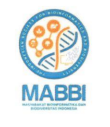RT-PCR Efficiency Analysis for BCL-2 Gene Using Saliva Samples
Abstract
Cancer ranks as the second deadliest disease globally, with Indonesia in Southeast Asia bearing the highest number of cancer patients with fatalities. Cancer is characterized by uncontrolled cell division, often attributed to genetic mutations. One such mutation can occur in the BCL2 gene, pivotal in the apoptosis process. Research into the BCL2 gene expression levels in cancer patients is crucial for therapy development and cancer patient management. This study conducted an in-house RT-PCR efficiency test targeting the BCL2 gene. Saliva RNA samples from healthy individuals were used for the RT-PCR process. The RT-PCR results were visualized in standard curve format and analyzed using linear regression analysis with an R^2 value of 0.0778, indicating the lack of observable RT-PCR reaction efficiency. Based on these findings, the results are not reproducible enough across different personnel, timeframes, and sample sets.
Keywords: BCL2, PCR Efficiency, Real-Time PCR, Serial Dilution, Standard Curve.Full Text:
PDFDOI: https://doi.org/10.47007/ijobb.v8i3.237
Refbacks
- There are currently no refbacks.
| Indonesian Journal of Biotechnology and Biodiversity Published by: Publishing Department of Esa Unggul University Arjuna Utara No 9 Street Kebon Jeruk Jakarta - 11510 Indonesia | |








.png)

